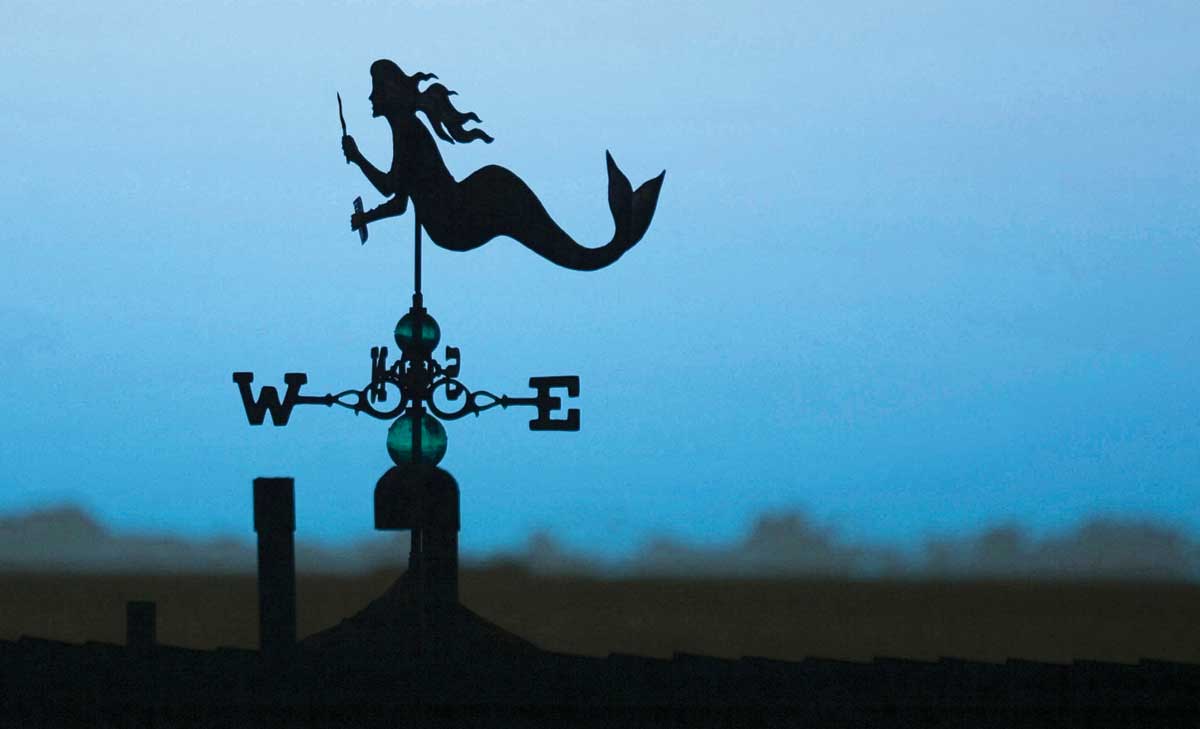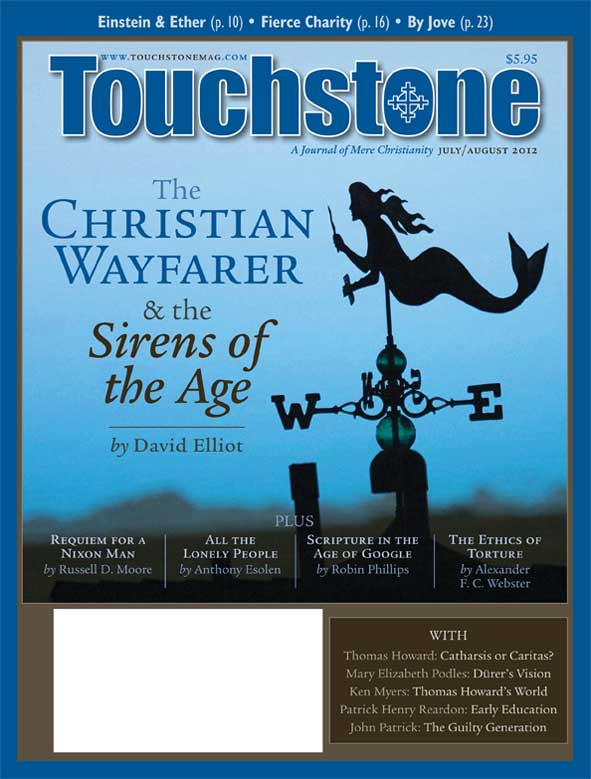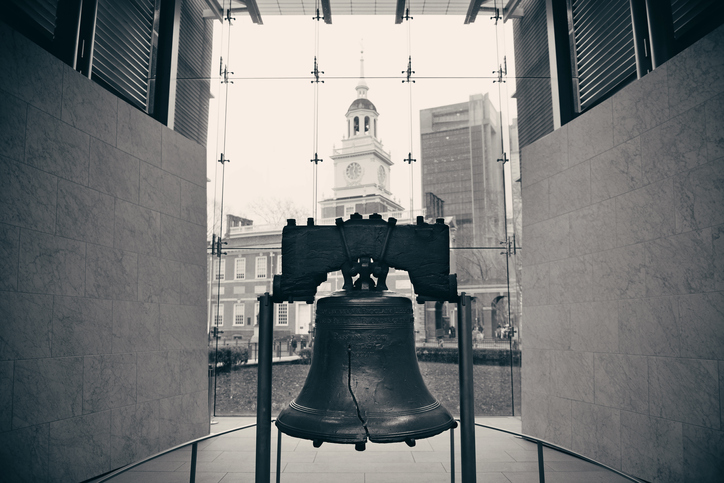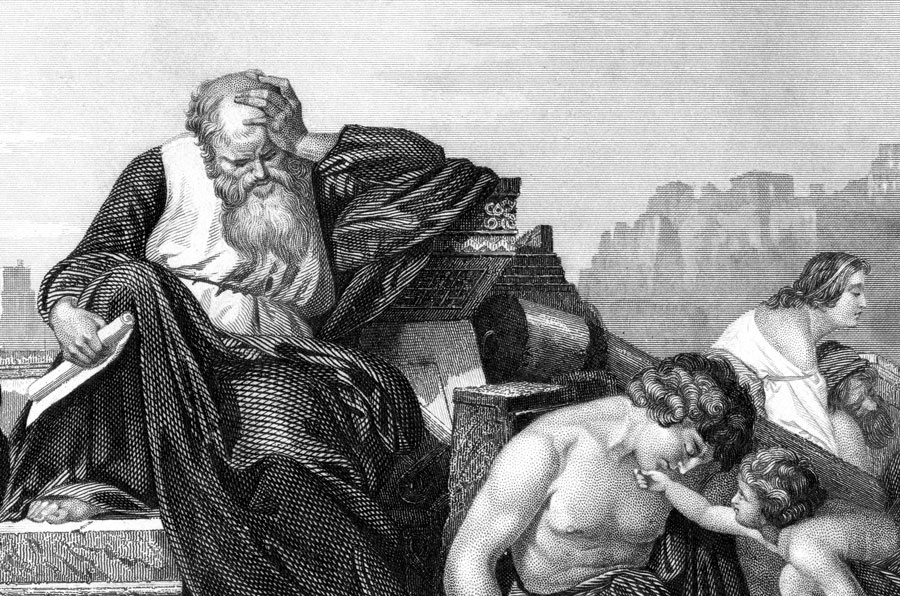Feature
Passing Through the Sirens
The Trials of the Christian Wayfarer in the World
Serious moralists of the past always warned Christians against three sources of temptation: the world, the flesh, and the devil. Most people can script the flesh and the devil into tempter roles of some kind, but what are we to make of the third category, the world? When we speak of "the world," we usually mean either the planet we live on or everybody living in it. With respect to the first, who could imagine hills or turnips tempting the soul to hell? And regarding the second, does it not seem a bit misanthropic to seat the human race at the devil's right hand?
Clearly, whatever our ancestors meant when they spoke of "the world" in cautionary tones, we have forgotten it. Since we may have done so at our peril, it behooves us to go back to where they started, and look at the view of "the world" they originally got from Scripture.
The Villain of the Piece
The New Testament speaks terrible things about something translated as "the world." Again and again we hear of it as a society of liars and killers, of brainwashed and arrogant men who parrot the gibberish and lurch into the snares set for them by demonic powers. The resulting picture is of a great, roaring machine of idiocy that focuses the Christian's gaze down here, and tempts him to forget his true homeland, the "Jerusalem which is above" (Gal. 4:26).
Thus, when Jesus was tempted in the wilderness, the devil "showed him all the kingdoms of the world in a moment of time," asserting that the world "has been delivered to me, and I give it to whom I will" (Luke 4:5–6). If that does not make us tremble, we should notice that, far from contradicting him, Christ later confirms that the devil is "the ruler of this world" who must be "cast out" (John 12:31). We are also told that the world cannot receive the "Spirit of truth" (John 14:17). This is no surprise, since the devil in the Apocalypse is called "the deceiver of the whole world" (Rev. 12:9).
World-bashing receives its most blunt spokesman in the Apostle James: "Do you not know that friendship with the world is enmity with God? Therefore whoever wishes to be a friend of the world makes himself an enemy of God" (James 4:4). Perhaps most chillingly, the beloved disciple writes: "If anyone loves the world, love for the Father is not in him" (1 John 2:15). This is because "the whole world is in the power of the evil one" (5:19).

If the modern reader does not come away from such passages pale and sweating, one can only conclude that he must be to Scripture as "the ass to the harp." For whatever is meant by "the world" in the Bible, it is plainly one of the main villains of the book, and it is always there, always seducing. It has eerie similarities with Plato's cave in the famous allegory, and with Maya, the goddess of illusion in Hinduism, whose veil, draped over the eyes of men, lulls them into unthinking oblivion.
The dark mood in which the Church-persecuting world is spoken of in the Book of Revelation is perhaps matched only by the horrible whispers about Mordor in The Lord of the Rings. The fact that relatively few theologians, Scripture scholars, or even homilists mention "the world" as a permanent and malignant background to the Christian vocation should be astonishing. But then again, if the scriptural picture of the world is right and they have been hoodwinked by it, this is just what we should expect.
Though the watchmen may sleep, the fact remains that to ignore the constant and damning references to the world is to miss what Scripture thinks the setting of the human story is, and therefore to misread the genre of that story. It would be like reading a ghost story about what happened in a haunted castle while failing to notice that the castle was haunted. We need only note what kind of miracle Jesus performs most frequently in the New Testament to see that we are in a similar fix; the world is indeed a malevolently haunted castle. The New Testament sounds more often like The Exorcist than A Christmas Carol. The bits that sound like Paradiso are the ones that point beyond this world, not to it.
Three Senses of "World"
So what is the world, that it should be so malignant? There are several Greek terms in the New Testament that all get translated as "world," and not all are wicked.
The first terms are ge and kosmos. These typically refer to "the green smiling earth," which God fashioned from nothing into orderly arrangements and called "very good." When we think of the world as landscapes, flora, and fauna, or even as "the whole universe," it has this sense. To label it evil in this respect would bring back that old wraith Manicheaism.
The second sense of "the world" in the New Testament is he oikoumene or "the inhabited earth": a neutral term referring to people generally, whom Christ came to save. It is in this respect that the gospel is to be "preached in all the world" (Matt. 24:14).
The third world-term is aion. It is a temporal term meaning "epoch," "period," or "age." This is "the world" that Scripture usually rails against: "the present aion" (Matt. 12:32), which fell into sin, is now in the power of the evil one, and is passing away. Its dominant images are Babylon and Babel: the cities of corruption and confusion. It is quite distinct from the new, everlasting "world to come" (Matt. 12:32), in which the kingdom of God will establish undisputed rule over all things.
The New Testament writers not being native Greek speakers, there is some slippage between the terms. For instance, John often uses kosmos to cover all three senses in different contexts.But the overall trends are there. As C. S. Lewis noted, the key theme of the world as aion is that it refers to an age whose defining characteristic is that it is evil. As iron-making was the specific feature of the Iron Age, and the rise of machines the special token of the Industrial Age, so evil is the particular characteristic of this age.
The jarring fact is that this wicked aion includes most of time. In fact, the only things that predated the evil aion were the first hours in Eden before the Fall, and the only thing that will completely post-date it is the world or aion to come: the "new heaven and new earth" (Rev. 21:1).
Interestingly, those born after Christ are living in a sort of twilight period between the ages. With the victory won through the Passion and Resurrection of Christ, this aion is already a dissolving phantasmagoria; a sort of theatre burning to the ground while the Christians point to the Exit sign and the worldlings keep munching popcorn.
The Christian as Homo Viator
Given this view of the world, what should be the role of the Christian with respect to it? In answering this, we should first note that every educated Christian has heard of certain "stock" characters whose titles are writ large in the dramatis personae of the Church. Thus, on the liturgical calendar, the saints are divided up into characters like the Martyr, the Virgin, the Doctor, the Bishop, and so forth. When it comes to vocations, we find characters such as the layman, monk, nun, hermit, friar, priest, and pastor, and hear of extinct characters like the stylite, "holy fool," pardoner, summoner, and almoner. What many have forgotten is that in the historic tradition, one finds a single "character" regarded as the most basic or representative of all Christians.
This character is the homo viator, the "human wayfarer," also known as the journeyman, pilgrim, or exile from the world. Given the scriptural view of the world, it is no surprise to hear the homo viator spoken of as someone "on the road" (in via) or "just passing through" this present and evil aion. For instance, in the Letter to the Hebrews, the author writes that the true promised land for which the Old Testament patriarchs hoped was not Israel or anywhere else sub luna. Rather, Abel, Enoch, Noah, and Abraham all "acknowledged that they were strangers and exiles on the earth. . . . They desired a better country, that is, a heavenly one" (Heb. 11:13–16).
Similarly, the Christian wayfarer (viator) is a pilgrim, exile, or journeyman whose quest is of the "getting home against steep odds" genre. But unlike, say, Odysseus's Ithaca, our home is on no common map: "For here we have no lasting city, but we seek one which is to come" (Heb. 13:14). When the wayfarer's journey is done, he goes from the ardors of being "on the road" (in via) to rest and rejoicing "in the homeland" (in patria). His quest fulfilled, homo viator becomes homo comprehensor: one who has "grasped" or "laid hold of" the prize he was born for.
Though the world may be a road rather than a home to him, this does not mean the wayfarer is aloof to social justice. As the Parable of the Sheep and Goats chillingly shows, there is no road to heaven through this world that does not include works of justice and mercy. "As they go through the valley of Bitterness they make it a place of springs" (Ps. 84:6)
The Wayfarer's Expectations
On the journey, the world, in concert with the devil, will throw up obstacles to stop the pilgrim from reaching his goal. To get a literary image of the wayfarer, we must imagine a derided but secretly great man walking on a lonely, vast, and perilous road; wearing tattered clothes, harried by enemies, leaning on a stick, going through strange landscapes, and receiving supernatural signs as he pursues a quest pregnant with an indescribable sense of importance. In classical and scriptural writings, Ulysses, Aeneas, Tiresias, Abraham, and Moses are often held up as good types or allegories of homo viator.
Later authors, too, self-consciously depicted the Christian life as a quest of wayfaring or pilgrimage. The most famous is Dante, who portrays himself in The Divine Comedy as a pilgrim journeying through Inferno, Purgatorio, and Paradiso. A humble companion to the Comedy is John Bunyan's Pilgrim's Progress, which, as its subtitle says, shows Christian progressing "from This World to That Which Is to Come."
The best modern example is The Lord of the Rings. Its wayfarers receive enchanted "waybread" (in its Latin form of viaticum, "waybread" was a beloved Eucharistic term), and they follow, meditate on, and sing about "the Road" so much that it almost becomes one of the main characters itself. And it is hardly fortuitous that the Road ultimately leads "beyond the circles of this world."
This image of the Christian as a wayfarer is a uniquely apt one to appeal to our sense of adventure. In a culture dying of boredom, this will be of use. Take, for example, standard Christian attitudes about original sin and suffering. Many think of concupiscence as a curse they did nothing to acquire but are forced to struggle against anyway. But surely this is a miserable view calculated to discourage. Likewise, we often regard pain and suffering as detestable interruptions in what should be a life of ease and plenty. This also has a tendency to make us feel like unhappy victims much of the time.
But suppose I did not think of myself as a regular person just aiming for a nice life. Suppose, without excluding the desire for happiness, I thought of myself primarily as a wayfarer on a literal quest. I would then recall that every wayfarer should expect to be waylaid, and therefore I should, too. Rather than being surprised by temptation and suffering, I would then encounter them with a sense of adventure: as foes or obstacles in via that I must overcome to arrive at the end of my quest, in patria.
Sometimes I may stray from the road appointed as my vocation and, like Dante, "wake up in a dark wood." Often I may howl at injuries, like David in the wilderness. But at least I will see how being "waylaid" makes sense, given the kind of character I am and the genre of the story I am in. The daily need to fight my sloth or avarice will be to me as David's fight against Goliath, the loss of my job as the Holy Family's flight to Egypt. If we all thought this way, I think it would abolish most of the petty whimpering, discontent, and boredom that characterize so much of our walk through life.
The Sirens of the World
If the Christian is just a wayfarer passing through the world, must he adopt strict asceticism, condemn all culture and society, and in general walk about like a crank? Fortunately not. Saints Augustine and Gregory the Great both say that the wayfarer may legitimately enjoy the comforts of a few "wayside inns" on the journey, and that these inns correspond to the good and innocent pleasures one finds in life "on the road."
The danger comes from lingering at these inns at the expense of fulfilling one's quest, or in mistaking an inn for one's true home, and making a permanent stay. If that happens, the pilgrim has become "the worldly man" (Luke 12:19–20), and his state is then analogous to that of the characters in The Odyssey who ate the Lotus flowers and forgot their true home. As with Aeneas's companions who retired in Sicily instead of persevering in their vocation of founding Rome, or like the murmuring Israelites who died in the desert after refusing to follow Moses into the Promised Land, the uncorrected "worldling" is one who gives up the quest and is remembered by wiser wayfarers only as a character in a cautionary tale.
What are some of the ways in which the wayfarer is tempted to become a worldling and give up the journey to his heavenly homeland? In the church fathers, the travels of homo viator are seen as analogous to the journey of Ulysses. As Ulysses had himself tied to the mast and the ears of his men plugged so they would not hear the song of the Sirens, so the Christian wayfarer is carried in the ship of the Church, tied to the mast of the Cross, and told to ignore the sweet and perilous Siren songs of the world. A non-exhaustive list of such Siren songs may be drawn up from among the temptations warned of by Augustine, John Chrysostom, Gregory the Great, Thomas Aquinas, John Henry Newman, C. S. Lewis, and the tradition in general. We may enumerate these songs, and the worldlings they make, as follows.
The Siren of Wealth
Called Mammon in Scripture, this Siren sings a song that tempts the wayfarer to worldliness through avarice. She tells him to come off the road, buy himself an inn, and store up treasure on earth, where moth and rust destroy. If he gets down from the mast to follow her advice, the wayfarer becomes a worldling of either the "the hoarder" or "the spendthrift" variety.
The hoarder, or miser, loves the clink of gold on gold and stays awake at night counting his possessions, and going over columns of figures. Dragons lying on piles of glittering gold and greedy dwarfs swooning from treasure-lust were older symbols of him; today, a CEO in his private jet muttering about Wall Street or perusing the stock market figures will do. By contrast, the spendthrift, or wastrel, craves the thrill of shopping and buying rather than accumulating or hoarding, and has a dozen maxed-out credit cards. Luke's stories of the rich young man who declines to follow Christ, and of the well-to-do farmer who "retires" (Luke 12:19) instead of persevering, are good examples of Mammon's worldlings.
This Siren's malediction is: "Cursed are the poor, for theirs is not the kingdom of this world." The viator who is waylaid by Mammon is told to fight back through almsgiving. The classic admonition is to sell all you have and give it to the poor, and so build up treasure in heaven (Matt. 19:21).
The Siren of Persecution
Referred to sometimes as "Caesar" or "the Beast," this Siren sings a song that tempts the wayfarer to cowardice. Her refrain is that he needs to fit in with other people, and how awful it will be if he is condemned by society and his peers. The church fathers identified this Siren mostly with the fear of physical persecution, so their cultural image for the Persecutor was that of Roman soldiers carrying you off to the lions.
But this Siren, who could never really get around Satan's criticism that she was to blame for the phenomenon of martyrs, has gotten more subtle. Her new technique is "soft persecution": to prod the wayfarer off the road by making him afraid to witness to truths that are "out of season" and that will socially ostracize him. The trick is to play upon his nerves with visions of being alienated from family, friends, or peers; of losing a job or being denied tenure or a promotion; or of looking like a fundamentalist, crank, or fanatic. The pressure imposed by the New York Times, the BBC, and other media and cultural outlets to get people to tacitly deny Christ's "hard sayings" is one type of this soft persecution.
This Siren's malediction is: "Cursed are those who are persecuted for righteousness' sake, for theirs is not the kingdom of this world." The wayfarer lured by this Siren is advised to remember: "If anyone is ashamed of me and of my words, of him will the Son of Man be ashamed when he comes in his glory" (Luke 9:26).
The Siren of Vanity
This Siren tempts the wayfarer to leave the road and come into a very diverting inn full of fame, glory, glitz, and fashionableness. Vanity's song used to be addressed mainly to triumphing athletes, legendary beauties, victorious generals, and great achievers in the arts and sciences. The game was to get the wayfarer hooked on a world in which he was petted and admired, or, if he lacked the talent for that, to make him one of the starry-eyed fans whose "minds lick up shadows."
But Vanity has stuck to her vulgar side lately and preferred to dabble in dirt. Rather than exalting conquering generals and poet laureates, she now gets people to idolize and mimic pop culture celebrities devoid of virtue, character, or any real accomplishment; many of them lack even a rag of talent or beauty. Vanity peddles the glitter, flashiness, and futility behind just about every TV show, movie, and advertisement, as well as the mania for various sports and athletes. Obsessions with American Idol, Cosmopolitan magazine, ESPN, Las Vegas, or a Paris fashion runway, and vapid talk about "what's in," are all good images for Vanity.
This Siren's malediction is: "Cursed are those who mourn, for they shall not be comforted." Wayfarers who meet Vanity on the road are encouraged to memento mori through things like visits to graveyards and meditations on such verses as "All flesh is as the grass, and all its glory is as the flower of the field" (Is. 40:6).
The Siren of Power
This Siren sings to the wayfarer a song of pride, telling him that he should become the great man before whom the puny tremble. She prompts him to seek power over others, either to "benefit" them, or just because he is "worthy" to rule. The first rationale creates the ideological or self-deceived tyrant; the second, the pure tyrant. The ideological tyrant justifies his lust to dominate society by convincing himself that he will do it good. By this means, many historical monsters have been able to sleep like babies. But for the pure tyrant, appeals to power-lust need no conscience sweetener: the will to power is its own justification.
But this Siren does not just dupe the great. Her most common product is the petty tyrant or little Napoleon. Anyone who likes to boss people around, put others in the wrong, humiliate or manipulate people, or take control of any social group he's in, large or small, is a worldling of this Siren, even if his "kingdom" is no bigger than a frowning circle of friends, family members, or co-workers.
Whether addressed to the full-fledged tyrant or just the common bully, this Siren's malediction is: "Cursed are the meek, for they shall not inherit the earth." The wayfarer who meets this Siren is reminded to wash the feet of his brethren, and not to "lord it over each other, as the Gentiles do."
The Siren of the Times
Omnipresent and perhaps the most representative of the Sirens, this one sings a lullaby of intellectual and spiritual sloth, telling the wayfarer that "reality" is reducible to the standards and worldview of his own society. The goal is to turn him into a cipher by making him define reality wholly through the Zeitgeist or "spirit of the age," with all its ideologies, propaganda, and fashionable opinions, through which the devil primarily exercises his role as "the deceiver of the whole world." If successful, this Siren turns the wayfarer into a "weathercock" man, for whom reality just means the latest thing trumpeted in opinion polls, statistics, "recent studies," and the like. Loudspeakers used by this Siren are the standard newspapers, radio and TV talk shows, newscasts, and other forms of media that people naively assume provide them with an accurate picture of "the real world."
The weathercock stares blankly when he hears Socrates' motto: "The unexamined life is not worth living." This Siren follows the wayfarer on the road at all times, and he fights her by remembering this motto: "Be not conformed to this world, but be transformed by the renewal of your mind" (Rom 12:2).
The Siren of the Elite
This Siren sings to the wayfarer the most powerful and subtly deadly of the world's songs: that of the pride felt in belonging to a superior and exclusive club. The group may preen itself on its spiritual, intellectual, cultural, national, or other pretensions. "We" may be the Pharisees versus the rabble, the Greeks versus the "barbarians," the aristocracy versus the peasants, the cultured versus the philistines, the well-informed versus the uneducated, or any group that deems itself superior to others in some way. The goal is to be counted among the pre-eminent, the important, the distinguished, those "in the know." Ambition to get into or move up in such a group, and snobbery once one has "arrived" there, are the main themes in this Siren's song. Her swaggering worldling often makes for a familiar if detestable highbrow: call him the initiate, the VIP, or the chosen one. Unlike the weathercock, the VIP cuts a dash among the intellectual, artistic, or even spiritual elite, and looks down upon the "vile mob" or "illiterate herd" with scorn.
In Christ's day, it was the Pharisee or "pure one" who thought himself too good to repent (Luke 7:30), and barked of the common people: "This mob that knows nothing of the law is accursed!" (John 7:49). In our day, the VIP is usually an intellectual, aesthete, or "expert" in a professional or elite society. But like the professionally holy Pharisee, his motto is: "I thank thee that I am not like other men."
As C. S. Lewis deftly noted, the VIP's coterie usually consists of an outer and an inner ring. The outer, inferior ring mediates the Zeitgeist to fellow VIPs (and through them, to the weathercocks) in a manner novel enough to conceal the fact that he is just parroting what everybody already thinks. This is usually done through arcane polysyllables and sophisticated jargon that makes the simple look profound. The VIPs use this mirage of profundity to cow others and to reinforce their own sense of superiority over the "mob," to whom their polysyllables are meaningless. Great name-droppers as well, these outer-ringers always tell you they went to Harvard or Princeton and never omit putting "M.D." or "Ph.D." beside their names.
The inner, superior ring of VIPs is more daunting: instead of just serving up the Zeitgeist, they are talented and manipulative enough to push it farther in the (purely worldly) direction in which it was already going. This makes the outer-ringers praise them as "bold" and "progressive." The highest VIPs may even alter the Zeitgeist for the worse by founding terrible ideologies or by instigating revolutions in the arts, sciences, economics, or politics.
This Siren's malediction is: "Cursed are the poor in spirit, for theirs is not the kingdom of this world." The wayfarer who encounters this Siren on the road is reminded to humble himself as a little child, and to take the lowest place at the feast (Luke 14:10).
The Middle of the Story
Does viewing the world as a haunt of Sirens amount to saying that society is evil? We know the usual consequences of such a view: the chosen ones withdraw into sects, and from the perch of their apocalyptic, world-renouncing, ascetical theologies, shake their wise grey locks in anger at a world they condemn—and which returns the compliment by viewing them as madmen.
But the truth is more complicated. "Society" means human beings living and doing things together. In our fallen aion, society's line of least resistance will be towards rather than away from the Sirens. Society is thus not evil by definition, but tends to it by default.
This is a big part of the "Bad News" that made the "Good News" necessary. But when some aspect of culture or society is benign, then surely that phenomenon belongs to the second definition of "the world" (he oikoumene, "the inhabited earth") in a way that does not imply corruption by the third definition (the evil aion). That benign aspect, and the chance for real if limited progress it affords, is a smoldering wick we should relight wherever we can, and never quench.
For we wayfarers find ourselves in medias res: born into the middle of a story whose setting includes all sorts of particularities having to do with family, house, neighborhood, town, culture, and nation, and no Christian need espouse a view that sees these as irrelevant to who we are. As Lewis put it, the resurrection of the body may include the resurrection of social goods as our "larger body," so that, e.g., the true England may be fulfilled rather than abolished in heaven.
But down here, "on the road," we must practice a certain contra mundum or be bewitched by the Sirens.For suppose my choices imply that I do not first think of myself as a Christian pilgrim seeking the heavenly country, but as someone primarily invested in money, possessions, power, entertainment, looks, ambition, prestige, and the like. In that case, the Sirens have gotten to me, and I have abandoned the quest of the wayfarer. I am no longer merely "in" the world, but "of" it. •
David Elliot is a Ph.D. student in Moral Theology at the University of Notre Dame. He is currently writing his dissertation on "Rethinking Happiness: The Role of Hope in Virtue Ethics." He and his wife Sarah and their four children attend St. Pius X Catholic Church in Granger, Indiana.
subscription options
Order
Print/Online Subscription

Get six issues (one year) of Touchstone PLUS full online access including pdf downloads for only $39.95. That's only $3.34 per month!
Order
Online Only
Subscription

Get a one-year full-access subscription to the Touchstone online archives for only $19.95. That's only $1.66 per month!
bulk subscriptions
Order Touchstone subscriptions in bulk and save $10 per sub! Each subscription includes 6 issues of Touchstone plus full online access to touchstonemag.com—including archives, videos, and pdf downloads of recent issues for only $29.95 each! Great for churches or study groups.
Transactions will be processed on a secure server.
more on christianity from the online archives
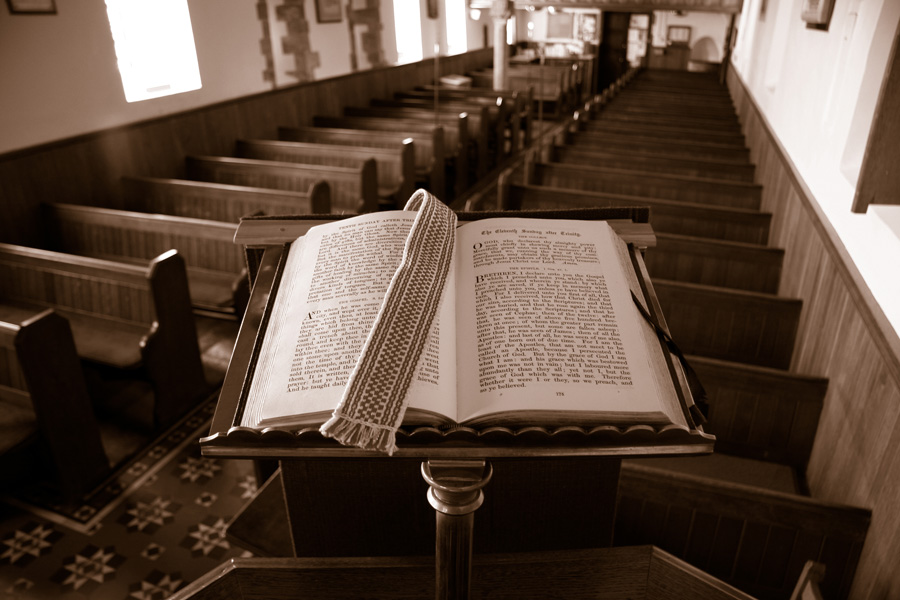
8.4—Fall 1995
The Demise of Biblical Preaching
Distortions of the Gospel and its Recovery by Donald G. Bloesch
more from the online archives

33.2—March/April 2020
Christian Pro-Family Governments?
Old & New Lessons from Europe by Allan C. Carlson
calling all readers
Please Donate
"There are magazines worth reading but few worth saving . . . Touchstone is just such a magazine."
—Alice von Hildebrand
"Here we do not concede one square millimeter of territory to falsehood, folly, contemporary sentimentality, or fashion. We speak the truth, and let God be our judge. . . . Touchstone is the one committedly Christian conservative journal."
—Anthony Esolen, Touchstone senior editor





